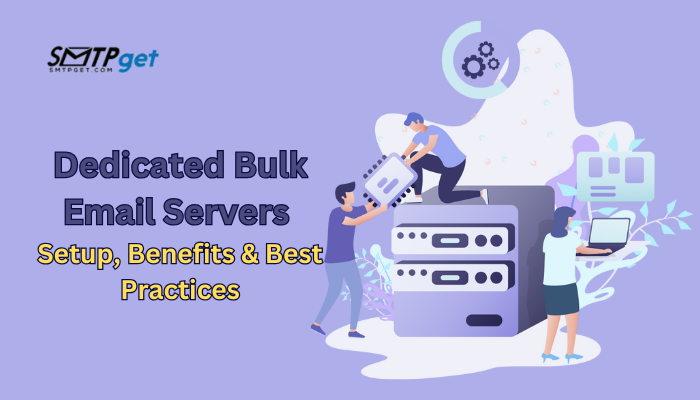Dedicated Bulk Email Servers- Setup, Benefits & Best Practices

Strong 8k brings an ultra-HD IPTV experience to your living room and your pocket.
Email marketing remains one of the most effective channels for businesses to engage with their audience. However, a dedicated bulk email server becomes necessary for businesses that need to send large volumes of emails whether for marketing, transactional purposes, or newsletters.
This guide will explore what dedicated bulk email servers are, their benefits, setup process, best practices, and how to choose the right provider.
What is a Dedicated Bulk Email Server?
A dedicated bulk email server is a separate email server that is used exclusively for sending large volumes of emails. Unlike shared email servers, where multiple businesses use the same infrastructure, a dedicated bulk email server provides exclusive resources, ensuring better deliverability, control, and scalability.
How It Works
A dedicated bulk email server operates on the Simple Mail Transfer Protocol (SMTP), which facilitates the sending of emails to recipients' mail servers. It consists of:
- SMTP Server- Handles the transmission of emails.
- IP Address- Assigned to ensure reputation management.
- Email Sending Software- Allows users to manage campaigns, track analytics, and ensure compliance.
- Authentication Protocols- Includes SPF, DKIM, and DMARC to ensure email legitimacy.
Benefits of Using a Dedicated Bulk Email Server
Using a dedicated bulk email server offers several advantages, especially for businesses and marketers focused on high-volume email campaigns. Here are the key benefits:
1. Better Email Deliverability
Since a dedicated server is used exclusively by one sender, it helps build a strong sending reputation, reducing the chances of emails being marked as spam.
2. Increased Sending Limits
Unlike shared SMTP services, which may impose restrictions on the number of emails sent per day, a dedicated server allows higher sending limits.
3. Enhanced Security & Privacy
Dedicated servers provide full control over email data, reducing the risk of third-party access and potential data breaches.
4. Customization and Control
Users can configure the server according to their requirements, including setting email authentication protocols, adjusting sending speeds, and monitoring IP reputation.
5. Cost-Effective for Large Campaigns
For businesses sending millions of emails per month, a dedicated server can be more cost-efficient compared to pay-per-email models of shared platforms.
How to Set Up a Dedicated Bulk Email Server
Setting up a dedicated bulk email server requires careful planning to ensure high deliverability, compliance, and optimal performance. Here's a step-by-step guide:
Step 1: Choose a Reliable Hosting Provider
Select a hosting provider that offers dedicated servers with email-friendly policies, such as Amazon Web Services (AWS), Google Cloud, or specialized SMTP service providers like SMTPget, iDealSMTP, or SendGrid.
Step 2: Install Email Server Software
Some popular email server software solutions include:
Postfix: A widely-used open-source mail transfer agent.
Exim: Commonly used on Linux servers.
PowerMTA: A high-performance enterprise-grade email software.
Step 3: Configure Email Authentication
Setting up authentication protocols is crucial to ensuring your emails do not get flagged as spam:
SPF (Sender Policy Framework): Ensures emails are sent from authorized servers.
DKIM (DomainKeys Identified Mail): Adds a digital signature to emails to verify authenticity.
DMARC (Domain-based Message Authentication, Reporting & Conformance): Defines how an email from your domain should be handled if authentication fails.
Step 4: Warm Up Your IP Address
To avoid getting blacklisted, gradually increase the volume of emails sent over time. This process, known as IP warm-up, helps build sender reputation with ISPs (Internet Service Providers).
Step 5: Monitor Server Performance & Deliverability
Use email tracking tools like Postmaster Tools (Google), MXToolBox, and SNDS (Microsoft) to monitor IP reputation and troubleshoot deliverability issues.
Best Practices for Managing a Dedicated Bulk Email Server
1. Maintain a Clean Email List
Regularly clean your email list to remove invalid or inactive addresses, reducing bounce rates and improving engagement.
2. Segment Your Email Campaigns
Instead of blasting emails to your entire list, segment based on user behavior, location, and engagement levels for more personalized messaging.
3. Use Throttling to Control Email Sending Speed
Sending too many emails too quickly can trigger spam filters. Throttling helps control sending speed and improve inbox placement.
4. Monitor Blacklists & Remove Listings
Check whether your IP or domain is blacklisted using tools like Spamhaus and Barracuda. If blacklisted, follow delisting procedures.
5. Enable Email Analytics & Reporting
Track open rates, click-through rates, bounce rates, and spam complaints to optimize your campaigns and improve performance.
Choosing the Right Dedicated Bulk Email Server Provider
When selecting a provider, consider the following factors:
1. Reputation & Deliverability
A provider with a strong IP reputation and deliverability track record ensures your emails land in inboxes rather than spam folders.
2. Scalability & Performance
The server should be able to handle your email volume needs efficiently.
3. Pricing & Cost Structure
Compare pricing plans to find a cost-effective solution without hidden fees.
4. Support & Technical Assistance
24/7 customer support is essential for troubleshooting issues quickly.
5. Compliance with Email Laws
Ensure the provider supports compliance with regulations like GDPR, CAN-SPAM, and CASL.
Popular Dedicated Bulk Email Server Providers
SMTPget- A reliable SMTP service provider known for its deliverability-focused solutions.
iDealSMTP- Offers scalable email delivery services.
MailGun- Developer-friendly email API and bulk-sending solutions.
Amazon SES- Cost-effective email-sending service by AWS.
PowerMTA- Enterprise-level software for bulk email delivery.
Conclusion
A dedicated bulk email server is a powerful tool for businesses looking to send high volumes of emails with maximum deliverability, security, and control. By carefully selecting the right provider, following best practices, and continuously monitoring performance, businesses can achieve higher engagement and better ROI from their email marketing efforts.
Whether you're running a startup or a large enterprise, investing in a dedicated bulk email servers can be a game-changer for your email marketing strategy.
Note: IndiBlogHub features both user-submitted and editorial content. We do not verify third-party contributions. Read our Disclaimer and Privacy Policyfor details.







